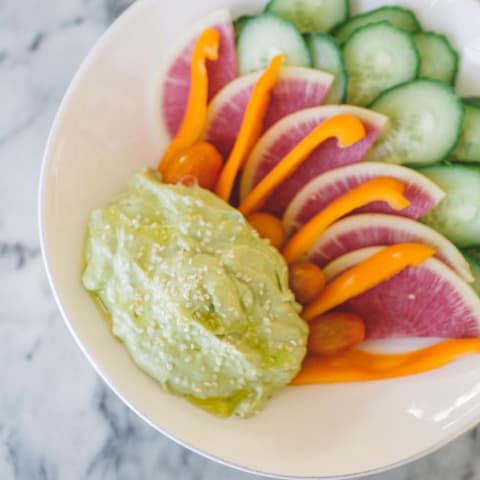Advertisement
Snacking Can Make You Age Faster — And Gain More Weight. A Celebrity Nutritionist Explains Why

A lot of people grab a latté, an energy bar, a juice, a muffin, or a 100-calorie pack of something without reviewing the macronutrient content and thinking about what it will do to their hunger. The answer is, not much. Snacking isn’t eating to satiety; it’s a stopgap and, depending on what you choose, it might actually make you hungrier later.
Meals full of a mix of macronutrients not only fuel you up with what your cells need to proliferate, but they also turn off hunger hormones and elongate your blood sugar curve. Notice my choice of words—I said meals, not snacks. Meals are key.
Snacking delays the inevitable and can disrupt your digestion process.
If you’re hungry, eat a real meal (preferably full or protein, fat, fiber, and greens to biologically calm hunger). When you turn off your hunger with enough of the right foods, you’re learning to reset your body-brain satiety signals. Essentially, you’re learning how to eat only when you are really hungry, not when you are in a craving state.
I can hear you thinking, how on earth can I go as long as four to six hours without feeling hungry? Many of my new clients have that same question, followed by this one: Don’t I need to stoke my metabolism by eating every three hours? No.
Research shows that eating frequently is actually unhealthy and detrimental to weight-loss goals.
The latest endocrine science tells us that eating every three or four hours actually sets us up for not only exhaustion and premature aging but also less fat burning. But why?
Digestion takes time.
When you eat, you begin the process of digestion, which requires your body to expend a lot of time and energy to break down food into molecules that can be absorbed and utilized. Complete digestion usually takes six hours or more. When you eat snacks in between meals, you tax your body. You are asking it to restart a process it has not yet completed from the last time you ate. Not only does this take energy away from other repairs your body is making (hello, tired eyes), but it also leads to weight gain. When your body cannot absorb and utilize food, it stores it as fat. In addition, restarting the process of digestion by snacking cuts short your body’s ability to burn fat in between meals.

Your body needs a break!
A 2014 randomized study1 compared the biological benefits of eating five to six small meals a day versus two larger meals (with the same caloric intake) to determine biological benefit on body weight, hepatic fat content, insulin resistance, and beta cell function. The study concluded that fewer larger meals reduced body weight, hepatic fat content, fasting plasma glucose, C-peptide and glucagon, and increased oral glucose insulin sensitivity. Not only are we better equipped to deal with the calories we eat when we have proper breaks, but our body responds positively.
Your snacks are junky carbohydrates.
I am just going to say it—many of the snacks (even protein bars!) that people reach for are carbohydrate bombs. When you look at a nutrition fact label, you need to ask yourself: What is the majority of this comprised of? It doesn’t really matter if your carbohydrate bar, date-rich protein ball, crackers, or chips are grain-free, gluten-free, or vegan—they are filling you with blood sugar and causing the release of insulin. If you eat unbalanced quick meals with processed foods, your blood sugar quickly rises and falls within three hours, leaving you with low blood sugar but still full of insulin, which causes you to crash and crave more carbohydrates, releasing even more insulin.
Insulin: Friend or foe?
Insulin acts like a cargo ship, picking up glucose (blood sugar) and transferring it from your bloodstream into your cells so that your nervous system, muscles, and other tissues and organs can utilize the glucose for proper functioning. Once the insulin has done its job, it can linger in your bloodstream for six to eight hours. In the meantime, it prevents the fat-burning process (it’s a storage hormone, after all), driving you to eat and making you crave what will bring your blood sugar back up—aka more processed fast carbohydrate snacks.
At the end of the day, you're probably better off eating meals that turn off hunger and giving your body that well-deserved break between meals rather than snacking on something that will flood your bloodstream with insulin and have you craving more junky food late.
Here are Kelly's smoothie add-ins that turn off hunger hormones, so you won't even want to snack before lunch. Plus, she dives WAY deeper into nutrition in this FREE video series.

Kelly LeVeque is a holistic nutritionist, wellness expert, and celebrity health coach based in Los Angeles, California. She received her bachelor’s degree from the University of Southern California and completed her postgraduate clinical nutrition education through UCLA and UC Berkeley. Be Well By Kelly grew out of LeVeque's lifelong passion for health, the science of nutrition and overall wellness. Guided by a practical and always optimistic approach, she helps clients improve their health, achieve their goals and develop sustainable habits to live a healthy and balanced life. She parlayed her passion for health, wellness, and nutrition into her first book, Body Love (Harper Collins) published June 2017.
LeVeque is passionate about the science of human nutrition. Driven by the desire to help her clients, and her own intellectual curiosity, she studies the latest research, evaluates competing theories and reads everything. Most importantly, she uses that knowledge to make individualized recommendations for her clients. She also loves to cook. LeVeque believes in real food, real ingredients and a clean diet. The Be Well kitchen is constantly buzzing, and loves creating tasty, clean, nutrient-dense recipes and dishes.
Before starting her consulting business, LeVeque worked in the medical field for Fortune 500 companies like J&J, Stryker, and Hologic, eventually moving into personalized medicine, offering tumor gene mapping and molecular subtyping to oncologists. She is a regular contributor for numerous health, wellness and lifestyle publications. LeVeque rounded out her education with a number of other certifications including being certified as a Health Coach through The Institute for Integrative Nutrition, her RYT-200 training though the American Yoga School, and NSCA-Certified Personal Trainer® (NSCA-CPT)® certification through the National Strength and Conditioning Association.
More from the author:
Functional Nutrition Training
Check out Functional Nutrition Coaching
A cutting-edge nutrition deep dive taught by 20+ top health & wellness experts
Learn moreMore from the author:
Functional Nutrition Training
Check out Functional Nutrition Coaching
A cutting-edge nutrition deep dive taught by 20+ top health & wellness experts
Learn more
Kelly LeVeque is a holistic nutritionist, wellness expert, and celebrity health coach based in Los Angeles, California. She received her bachelor’s degree from the University of Southern California and completed her postgraduate clinical nutrition education through UCLA and UC Berkeley. Be Well By Kelly grew out of LeVeque's lifelong passion for health, the science of nutrition and overall wellness. Guided by a practical and always optimistic approach, she helps clients improve their health, achieve their goals and develop sustainable habits to live a healthy and balanced life. She parlayed her passion for health, wellness, and nutrition into her first book, Body Love (Harper Collins) published June 2017.
LeVeque is passionate about the science of human nutrition. Driven by the desire to help her clients, and her own intellectual curiosity, she studies the latest research, evaluates competing theories and reads everything. Most importantly, she uses that knowledge to make individualized recommendations for her clients. She also loves to cook. LeVeque believes in real food, real ingredients and a clean diet. The Be Well kitchen is constantly buzzing, and loves creating tasty, clean, nutrient-dense recipes and dishes.
Before starting her consulting business, LeVeque worked in the medical field for Fortune 500 companies like J&J, Stryker, and Hologic, eventually moving into personalized medicine, offering tumor gene mapping and molecular subtyping to oncologists. She is a regular contributor for numerous health, wellness and lifestyle publications. LeVeque rounded out her education with a number of other certifications including being certified as a Health Coach through The Institute for Integrative Nutrition, her RYT-200 training though the American Yoga School, and NSCA-Certified Personal Trainer® (NSCA-CPT)® certification through the National Strength and Conditioning Association.